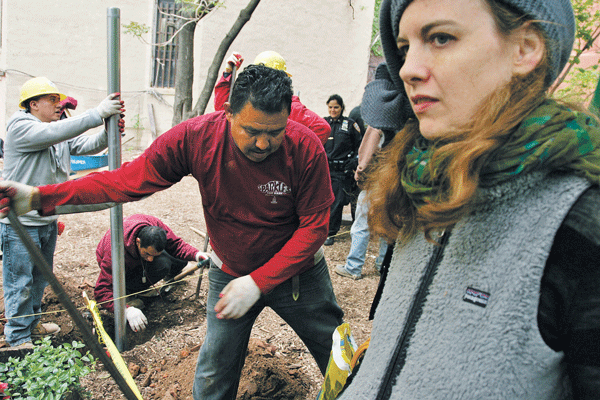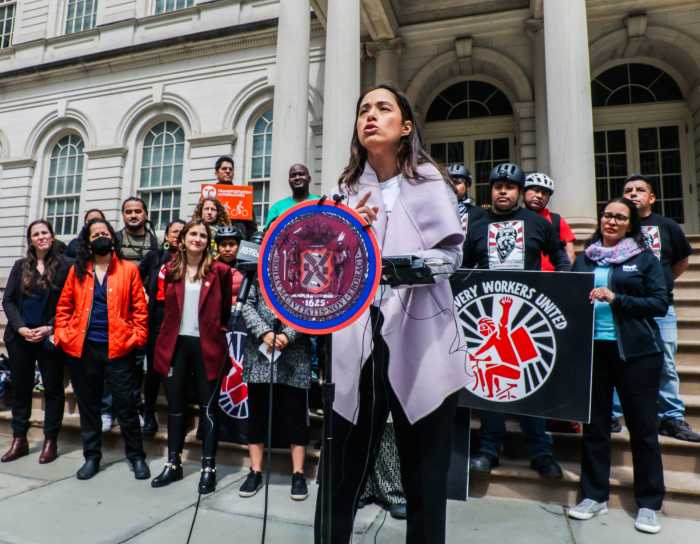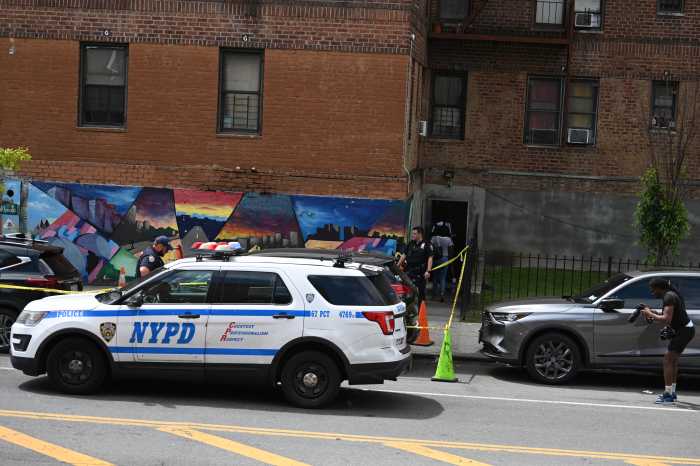
Aresh Javadi, far right, and environmental attorney Joel Kupferman, second from right, spoke to a representative of developer Serge Hoyda, left, at the Children’s Magical Garden on Wednesday.
Updated Saturday, May 18, 2 p.m.
BY SARAH FERGUSON
Developer Serge Hoyda staged a surprise attack on the Children’s Magical Garden Tuesday, when he dispatched a security detail and work crew to erect a chainlink fence to cordon off the portion of the garden he owns.
Hoyda and his partners at S&H Equities own one of the three small lots that make up the garden on the corner of Norfolk and Stanton Sts. The other two lots are owned by the city’s Department of Housing Preservation and Development.
A crowd of gardeners and supporters — including many students from the Lower East Side Preparatory High School across the street — gathered to protest as workers began digging big holes through their fresh plantings to install fence posts.
“You don’t have to do this!” a young man shouted at the workers, begging them to stop. Police strung up caution tape and forced the demonstrators back as surveyors set up equipment to lay out the fence, which effectively bifurcates the garden, making most of the sunny beds inaccessible.
Gardeners — who 30 years ago chased out junkies to take over what were then rubble-strewn lots — say they first caught wind of the owner’s plans to fence off the lot in March.
They reached out to Councilmember Margaret Chin, who sought to intervene.
“We expressed our very strong desire not to see a fence going up, and told him there was no real need for it,” said Matt Viggiano, the councilmember’s director of land use and planning. Viggiano said he put representatives of the owner in touch with officials at H.P.D., in hopes of working out some kind of deal where Hoyda could “swap” his relatively small parcel for another city-owned lot elsewhere.
But the talks apparently went nowhere, and the only notice the gardeners got was when workers showed up at 9 a.m. Tuesday with a power saw to break the front gate.
“It’s a total shock,” said Kate Temple-West, who has volunteered at the garden for the last 17 years and is now president of its board. “We were hoping he would wait and talk with us about potentially finding another space for his building through whatever means necessary.”
A crowd of high school students from LES Prep, which overlooks the garden, gathered outside the location to watch the police and workers tromp through the seedlings that they had sprouted in their classroom and planted in their “Pizza Peace Garden” the day before.
“They are killing our plants, our baby plants,” said Tamara Aulestiarte, an 18-year-old from Argentina. “Why are they doing this?”

Kate Temple-West, one of the directors of the Children’s Magical Garden, at right, watched in dismay as workers fenced off the land owned by Hoyda.
LES Prep is one of three schools that now use the garden as an outdoor classroom, along with Marta Valle and School for Global Leaders, all of which occupy the same building directly across from the garden.
A lawyer representing S&H Equities, Rex Whitehorn, argued with gardeners that the fence was essential for safety and liability reasons.
“There is a huge safety and insurance issue here,” he said. “There’s uneven grounds, there’s jagged rocks. The group that’s operating this garden has no reserve fund, no protection, no insurance. It’s absurd. If something happens, who is responsible for that?” he demanded.
According to gardeners, liability concerns had never been raised as an issue before. When asked why S&H did not give notice so the gardeners could at least move their plants, Whitehorn said: “The permit for the fence was open and notorious,” then declined to answer further, stating, “I’m done.”
A permit to erect a “construction fence” was granted by the Department of Buildings on April 29.
Earlier that morning, Whitehorn said S&H had been trying to work with Chin’s office to negotiate a deal with H.P.D.
“I gave him two months. I got nothing,” he said of Chin’s aide Viggiano.” I called three, four, five times, no response.”
Viggiano called that claim “inaccurate.”
Whitehorn also claimed he had called the number listed on the fence of the garden, which belongs to board member and More Gardens! co-founder Aresh Javadi. No one returned his call, he said.
Javadi said he never got a message from Whitehorn.
H.P.D. officials say they never discussed any “land swap” with the developer, noting that such land swaps are “not a common practice.”
The agency had previously been in talks with the developer about plans to build a mix of market-rate and affordable housing on the garden site.
H.P.D. said its two lots are still “reserved” for affordable housing, but there are no “definitive” plans for the site at this time.
Last fall, the agency offered the gardners an “interim gardening agreement” to allow them to continue gardening on its lots until they were designated for development. But the gardeners declined to sign it.

Taiyo Kizawa, 3, who lives around the corner from the garden and comes there often with his mother, played while workers fenced off the land owned by Hoyda.






































